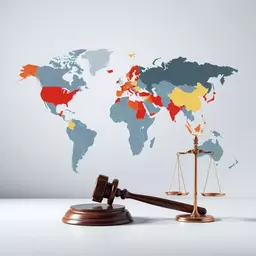Notable Interpol Red Notice Cases

Did you know that Interpol Red Notices, while vital for international law enforcement, can also be misused for political agendas? Understanding their significance is crucial in navigating the complexities of global justice.
What You Will Learn
- Red Notices Explained: They serve as requests to locate and provisionally arrest individuals, not as binding arrest warrants.
- International Cooperation: Red Notices enhance collaboration among countries to apprehend fugitives and uphold justice.
- Risks of Misuse: Political entities can exploit Red Notices, leading to significant human rights violations and biased legal processes.
- Key Case Studies: High-profile cases illustrate the manipulation of Red Notices for political suppression, affecting activists and dissenters globally.
- Human Rights Implications: Misuse poses threats to the right to a fair trial, freedom of expression, and protection from political persecution.
- Advocacy for Reform: Raising awareness and supporting reforms can help mitigate the misuse of Red Notices and protect individual rights.
Key Aspects and Implications of Interpol Red Notices
Understanding the implications and functionalities of Interpol Red Notices is crucial in the context of international law enforcement.
Key Aspects of Red Notices
- Non-Binding Nature: Red Notices do not compel countries to arrest or extradite.
- Basis of Issue: Issued based on valid national warrants.
- International Collaboration: Facilitate cooperation among member states.
Implications of Misuse
- Right to a Fair Trial: Biased legal proceedings may increase.
- Freedom of Expression: Activists may face suppression.
- Protection from Political Persecution: Risk of unjust extradition grows.
Significant Cases
- Jack Ma: Manipulated to suppress dissent.
- Dolkun Isa: Chilling effects on human rights activism.
- Hassan Mushaima: Political figures targeting opposition.
Calls for Reform
- Educate Yourself: Share information about Red Notices.
- Support Organizations: Contribute to human rights advocacy.
- Engage in Dialogue: Discuss these issues within your community.
Understanding Interpol Red Notices and Their Significance
When we talk about Interpol Red Notices, it’s essential to understand what they really mean. A Red Notice is not an arrest warrant but rather a request to locate and provisionally arrest a person pending extradition, surrender, or similar legal action. It’s issued at the request of a member country based on a valid national warrant. In essence, it serves as an international alert about a wanted person.
So, why are Red Notices significant? They are crucial tools in international law enforcement, allowing countries to cooperate and share information about fugitives across borders. However, their misuse can lead to serious consequences. This highlights the importance of understanding both the purpose and the potential pitfalls of these legal instruments.
Defining the Concept of Interpol Red Notices
To grasp the concept fully, let’s break down the key aspects of Interpol Red Notices:
- Non-Binding Nature: Red Notices do not compel countries to arrest or extradite the individual.
- Basis of Issue: They are typically issued based on a valid national warrant, but the reasons can vary widely.
- International Collaboration: They facilitate cooperation among member states to combat crime.
These components underscore the complexity surrounding Red Notices, especially as they can be used for legitimate law enforcement but can also be exploited for political motivations. Understanding this duality is crucial, particularly for those facing extradition issues.
Purpose and Intended Use of Red Notices
Red Notices serve several purposes that reflect their intended use in international law enforcement:
- Assist in the identification and location of individuals wanted for prosecution or to serve a sentence.
- Enable judicial authorities to request cooperation from other countries.
- Support the capture of fugitives who may try to evade justice by fleeing across borders.
At Extradition Interpol UAE, we recognize the crucial role Red Notices play in international justice. However, it’s important to be aware that the misuse of these notices can lead to significant legal and human rights implications, which we will explore further in the following sections.
Quick Summary
Here's a brief recap of the key points discussed so far:
- A Red Notice is a request for the location and provisional arrest of a wanted person, not an arrest warrant.
- Red Notices facilitate international cooperation in law enforcement but can be misused for political purposes.
- Understanding the implications of misuse is crucial for ensuring justice and protecting human rights.
Summarizing the Misuse and Implications of Interpol Red Notices
The misuse of Interpol Red Notices is a pressing concern that has far-reaching implications. From the cases of Jack Ma to those of activists like Dolkun Isa and Hassan Mushaima, we’ve seen how these notices can be weaponized for political gain. It’s essential to understand the ramifications of these actions not just for the individuals involved, but also for international legal standards and human rights.
Key cases highlight a pattern of political maneuvering that compromises the integrity of legal processes. For instance, the utilization of Red Notices against political dissidents underscores a significant deviation from their intended purpose. These misuse cases serve as a reminder of the need for reform and vigilance within the system.
Recap of Key Cases and Their Significance
Let’s take a moment to reflect on the pivotal cases we’ve explored:
- Jack Ma: His situation exemplifies how Interpol Red Notices can be manipulated within national contexts to suppress dissent.
- Dolkun Isa: His experience reveals the chilling effects that Red Notices can have on human rights activism.
- Hassan Mushaima: The repercussions he faced demonstrate the danger political figures pose to opposition voices.
- Carlos the Jackal and Julian Assange: These high-profile cases show how the legal complexities surrounding Red Notices can influence international relations.
- Ayman al-Zawahiri and Joaquín "El Chapo" Guzmán: Their notoriety emphasizes the global impact of Red Notices on efforts to combat transnational crime.
Each case serves as a vital lesson in the ongoing struggle for justice and accountability. As someone deeply invested in understanding these dynamics, I recognize the importance of vigilance against misuse in the field of extradition law.
The Broader Impact on International Human Rights
The implications of misusing Interpol Red Notices extend beyond individual cases; they resonate throughout the international human rights landscape. When nations exploit these notices, it poses significant threats to several essential rights:
- Right to a Fair Trial: The potential for biased legal proceedings increases.
- Freedom of Expression: Activists and dissenters may be silenced or punished.
- Protection from Political Persecution: The risk of unjust extradition grows, making it essential for individuals to stay informed about their rights.
Frequently Asked Questions (FAQs)
- What is an Interpol Red Notice?
- An Interpol Red Notice is a request to locate and provisionally arrest a person pending extradition, surrender, or similar legal action. It is not an international arrest warrant.
- Are Red Notices legally binding?
- No, Red Notices are not legally binding. They serve as alerts, and it is up to each member country to decide whether to arrest an individual based on their national laws.
- Can Red Notices be misused?
- Yes, Red Notices can be misused for political purposes, such as targeting political opponents or human rights activists.
- What rights do individuals have if they are subject to a Red Notice?
- Individuals subject to a Red Notice have the right to a fair trial, freedom of expression, and protection from political persecution. They should seek legal counsel to understand their rights and options.
- How can I get involved in advocating for reform regarding Interpol Red Notices?
- You can educate yourself and others about the misuse of Red Notices, support organizations advocating for human rights and legal reforms, and engage in conversations within your community to raise awareness.
- Where can I find additional resources on Interpol Red Notices?
- You can explore Interpol’s official website, Human Rights Watch, and Amnesty International for insights, reports, and advocacy tools related to human rights issues and Red Notices.
It is crucial for individuals and organizations alike to advocate for reform in the use of Interpol Red Notices. At Extradition Interpol UAE, we strive to shed light on these issues, providing insights and strategies to navigate the complexities of extradition laws and their implications for human rights. Awareness is the first step towards meaningful change!
Encouraging Awareness and Advocacy for Reform
As we reflect on the misuse of Interpol Red Notices, it becomes clear that raising awareness and advocating for reform is essential. Individuals can play a significant role in this movement, making their voices heard in support of human rights and legal integrity.
How Readers Can Get Involved in Human Rights Advocacy
Here are a few simple yet impactful ways to get involved:
- Educate Yourself and Others: Share information about the implications of Red Notices and their misuse.
- Support Organizations: Consider contributing to groups advocating for human rights and legal reforms.
- Engage in Conversations: Discuss these topics within your community to raise awareness and encourage dialogue.
Being proactive is key! Each of us can contribute to a larger movement aimed at protecting individual rights and holding systems accountable.
If you're facing challenges related to extradition, remember that specialized criminal defense lawyers in Dubai can provide critical assistance and guidance.
Additional Resources and Further Reading on Interpol Red Notices
If you’re interested in delving deeper into this topic, here are some resources to explore:
- Interpol’s Official Website: A comprehensive source for understanding Red Notices and their intended use.
- Human Rights Watch: Offers insights and reports on human rights issues globally.
- Amnesty International: Provides resources and advocacy tools for human rights defenders.
At Extradition Interpol UAE, I believe that educating ourselves and advocating for necessary reforms can foster a more just legal landscape. Together, we can navigate the complexities of extradition law and ensure that it serves its rightful purpose in upholding justice and human rights.
Recap of Key Points
Here is a quick recap of the important points discussed in the article:
- Definition of Red Notices: They are requests to locate and provisionally arrest individuals pending extradition, not arrest warrants.
- Significance: Red Notices enable international cooperation in law enforcement but can be misused for political purposes.
- Purposes: They assist in identifying and locating fugitives, support judicial cooperation, and combat cross-border crime.
- Misuse Examples: Cases such as Jack Ma and Dolkun Isa illustrate how Red Notices can be weaponized against dissidents and activists.
- Human Rights Implications: Misuse poses threats to the right to a fair trial, freedom of expression, and protection from political persecution.
- Advocacy for Reform: Raising awareness and engaging in advocacy are crucial to combat the misuse of Red Notices and protect human rights.



